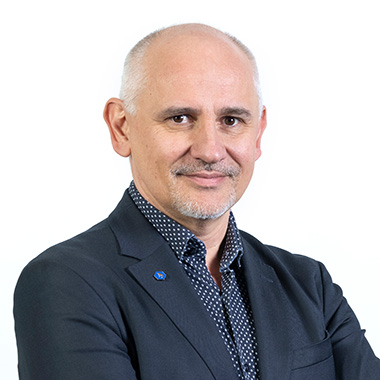GENERAL SEMINAR: Prof. Stephan Roche, ICREA Institucio Catalana de Recerca i Estudis Avancats, Barcelona, Spain

ICREA Prof. Stephan Roche is working at the Catalan Institute of Nanosciences and Nanotechnology (ICN2) and BIST. He leads the Theoretical and Computational Nanoscience group which focuses on physics of Dirac materials (graphene and topological insulators) and 2D materials-based van der Waals heterostructures. He pioneered the development of linear scaling quantum transport approaches enabling simulations of billion atoms-scale disordered models (www.lsquant.org). He studied Theoretical Physics at ENS and got a PhD (1996) at Grenoble University (France); worked in Japan, Spain & Germany; was appointed as assistant Prof. in 2000, CEA Researcher in 2004 and joined ICREA in 2009. He received the Friedrich Wilhelm Bessel prize from the Alexander von Humboldt Foundation (Germany). From 2013 till 2023, he has been very active in the Graphene Flagship, as leader of the work package SPINTRONICS and as DIVISION leader. Finally, he is leader and coordinator of the “Quantum Communications” activities at ICN2.
In this talk, I will discuss the emerging need to massively use and deploy Artificial Intelligence (AI) techniques in materials design and engineering.
AI is not only accelerating our access to complex information and knowledge, but is invading all sectors of our scientific practices and industrial innovation strategies. I will first overview our journey into the research of innovative advanced materials using AI in the field of interconnects technologies, and then point towards the coming revolution of fully describing digital models/twins with atomistic modelling, hence bringing the accuracy of first principles methods to unprecedented multimillions atoms models. This opens a revolutionary capability to correlate in-depth atomistic-scale features of as-grown materials with resulting local and global chemical, physical and devices properties, offering reverse engineering and AI-driven co-piloting for industrial innovation strategies.
All research and technology fields are to be radically affected and transformed by this AI revolution in materials science and technology, which I will illustrate in particular among the variety of research fields pursued during a decade by the Graphene Flagship initiative (https://graphene-flagship.eu/) and now continued within the Innovative Advanced Innovative Materials initiative/partnership (www.iam-i.eu), which will shape the future of European landscape for the ten years to come.